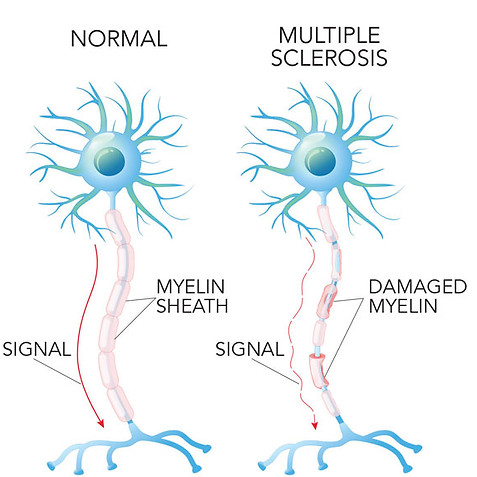
Image credit: MEDCLIQUE
THE BASICS
WHAT IS MULTIPLE
SCLEROSIS?
Multiple Sclerosis is an autoimmune disorder focused around the central nervous system. The immune system attacks the protective covering around nerves, thus breaking the connection between other nerve cells and cutting off electrical signals. This weakens the nerves that allow your body to function in various ways, from the way that you see and feel, to the way that you move.
The severity of this disease and its symptoms vary from person to person, and is dependent on uncontrollable factors. Treatment can help to mitigate the problem, but there is no known cure as of right now.
THE SCIENCE
WHAT CAUSES IT?
Multiple Sclerosis is an autoimmune disorder, meaning that the body harms itself. The immune system mistakingly recognizes myelin; a protective shield that covers nerves fibers, for a foreign invader, and attacks it as such. Without myelin, nerves become damaged. This, consequently, cuts off nerve flow and stops the sending of signals throughout the body. The immune system's attack on myelin damages the nerves that control movement, sensation, memory, cognition, and speech.
CELLS/SYSTEMS INVOLVED
White blood cells recognize foreign invaders in the immune system, and B cells produce antibodies against these “invaders.” In the immune system, B cells mistakenly attack myelin and oligodendrocytes, the cells that produce myelin, after white blood cells recognize them as harmful- despite the fact that they are not. This cuts off nerve flow and hurts the central nervous system.
*B cells are a type of white blood cell!*

Image credit: beaumont.org
This photo shows the difference in normal nerves and nerves affected by MS. To the right you can see damaged myelin that exposes nerve fiber, contrasted to the photo on the left with no visible fibers and strong myelin. The signals of nerves affected by MS are broken apart, compared to the clear line in the left image.
